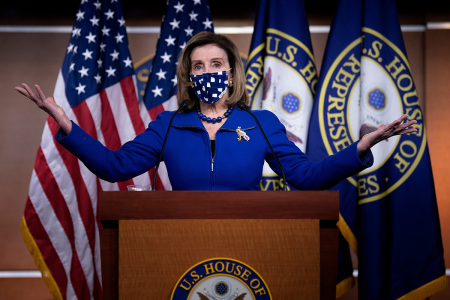Devout Catholics can't support gov't funding of abortion, Pelosi's archbishop says

A California archbishop whose territory includes the church that U.S. Speaker of the House Nancy Pelosi belongs to has argued that a person can't be a devout Catholic and support the government funding of abortion.
Last week, Democrat Pelosi cited her faith when answering a question to justify the effort to overturn the Hyde Amendment. This longstanding measure prohibits the federal funding of abortions in most circumstances.
In an interview with the Catholic News Agency published over the weekend, Archbishop Salvatore Cordileone of San Francisco rejected the attempted connection between Catholic belief and pro-choice public policies.
“Let me repeat: no one can claim to be a devout Catholic and condone the killing of innocent human life, let alone have the government pay for it,” Cordileone was quoted as saying.
“The right to life is a fundamental — the most fundamental — human right, and Catholics do not oppose fundamental human rights.”
During her press conference on July 22, Pelosi responded to a question about her support for repealing the Hyde Amendment. She said that as “a devout Catholic and mother of five in six years, I feel that God blessed my husband and me with our beautiful family — five children in six years almost to the day.” However, she said that it's not up to her to "dictate what other people should do."
"It's an issue of fairness and justice for poor women in our country," Pelosi said.
Cordileone took issue with the claim that overturning the Hyde Amendment would help advance healthcare among lower-income women, calling it “the epitome of hypocrisy.”
“… what about the health of the baby being killed? What about giving poor women real choice so they are supported in choosing life?” he continued.
“It is people of faith who run pro-life crisis pregnancy clinics; they are the only ones who provide poor women life-giving alternatives to having their babies killed in their wombs.”
The archbishop's remarks come as the Democrat-controlled Congress looks to pass a federal spending bill that would exclude the Hyde Amendment for the first time in decades.
Doing so would keep with the wishes of President Joe Biden, the second Catholic to serve as president of the United States. Biden campaigned on repealing the Hyde Amendment and proposed a budget without the measure in late May.
“Budgets are a statement of values,” stated Planned Parenthood Action on Twitter in May. “President Biden’s budget proposes to end the harmful Hyde amendment — making clear that federal law should support everyone’s ability to access health care, including safe, legal abortion, in this country.”
In May, Cordileone garnered headlines when he authored a pastoral letter recommending that pro-choice Catholic politicians not receive communion.
“Your Catholic ideals inspire you in your work to help those who experience discrimination, violence, and injustice, and you deserve the gratitude of your fellow Catholics and our nation for this service. But we cannot empower the weak by crushing the weakest,” wrote Cordileone.
“If you find that you are unwilling or unable to abandon your advocacy for abortion, you should not come forward to receive Holy Communion. To publicly affirm the Catholic faith while at the same time publicly rejecting one of its most fundamental teachings is simply dishonest.”
There has been much debate surrounding the issue of whether pro-choice politicians should be denied communion. Pro-life Catholics have called on bishops to draft a document advising ordinaries to deny communion to pro-choice Catholic politicians.
After U.S. bishops voted to approve the drafting of a "Document on the Meaning of the Eucharist in the Life of the Church,” the U.S. Conference of Catholic Bishops clarified that such a document would not lead to a blanket ban blocking pro-abortion politicians from receiving communion.
Earlier this month, New Mexico State Sen. Joe Cervantes was denied communion over his support for legislation that repeals the state's ban on abortion, which would make abortion legal in the state if the landmark Roe v. Wade U.S. Supreme Court decision legalizing abortion nationwide is ever overturned.





















